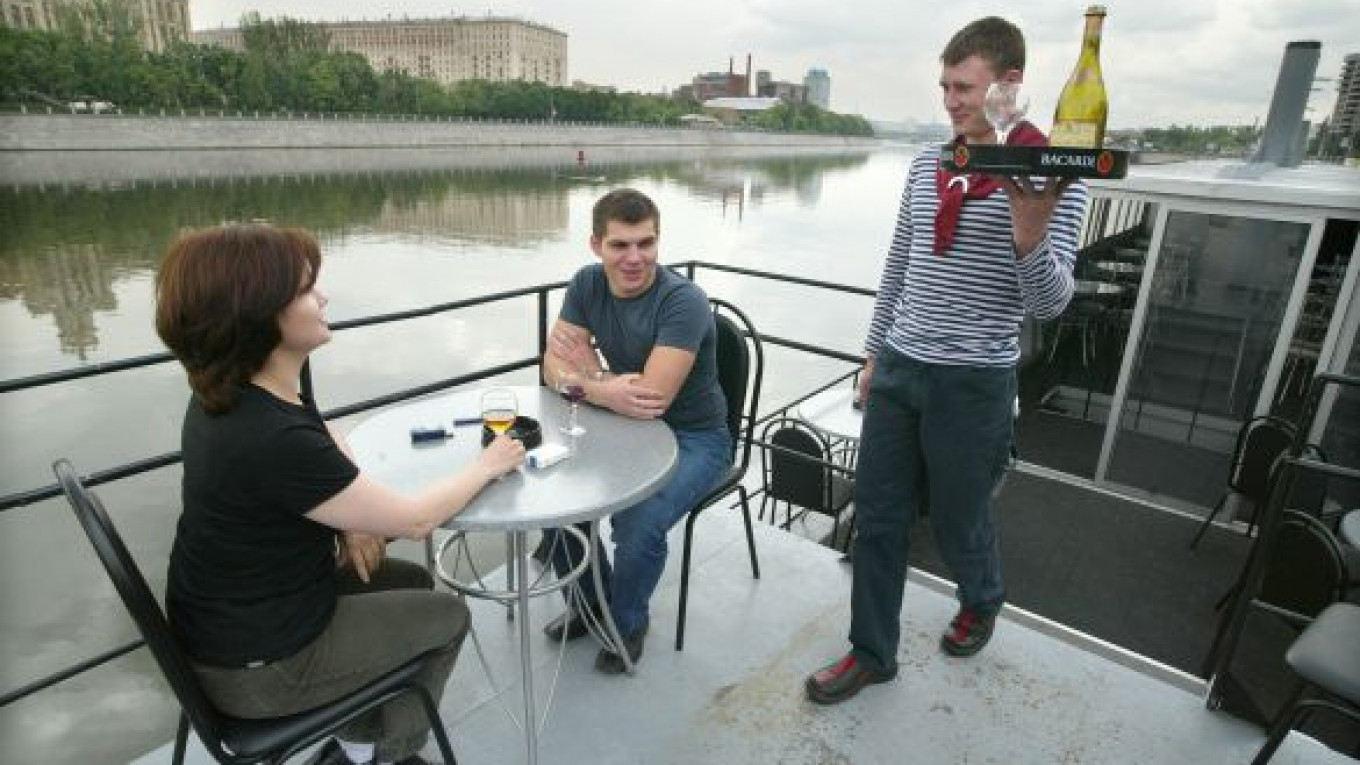Captain Valery Vinogradov has watched his life and his country transform as he stood at the helm of his ship.
He met his wife on one of his journeys. In 1993, bullet holes pierced the door of his steering cabin on the floating hotel Alexander Blok, which is moored close to the White House, when the ship was stormed during the attempted putsch.
And for the past 20 years, he has watched the Moscow River change from an empty passageway for aging Soviet ships to a burgeoning real estate market.
Vinogradov expects that his view will change even more in the coming months.
Last Wednesday, Moscow authorities announced their plans to convert 50 old barges and boats into floating hotels to reduce the city's room shortage. Moscow also recently ordered the National Shipowners Association to develop a pilot project on water transport for one route in the city center.
These developments are a big change from the previous administration's attempts to wipe out all private wharfs from the river.
Vinogradov recalled how the city shut down electricity and water on the Alexander Blok for four months at the start of 2007. The ship had to rely on generators and pay for water deliveries.
"It was a troublesome and costly thing, but we survived," Vinogradov said.
Investor interest has increased with the friendlier mood of the city officials.
The National Shipowners Association now has 400 investors across central Russia who are ready to start building ships once they get recommendations from the government, said the association's president, Andrei Novgorodsky.
Previous investments in water real estate are already paying off.
Marina Dabrundashvili, art director of the Lastochka floating restaurant, said the business is popular with clients, which include local celebrities and foreigners, largely because of its location.
"You can go five minutes from the center of Moscow and end up in what feels like outside the city, on the river with a view of a park," she said.
Lastochka's owners, who celebrated the restaurant's second anniversary last week, have already placed an order to build another floating restaurant and hope to open it within a year.
Water real estate is a big draw for investors because of its cost efficiency, Novgorodsky said. Floating businesses are cheaper because they are built from light materials and can be ordered from factories outside Moscow where the labor costs are lower.
Hotels cost the most at $1,500 to $1,900 per square meter to build, Novgorodsky said.
But even with the low construction costs, the major savings still come from renting water. An investor can rent water space, which is usually 2,500 square meters, from federal agencies for a mere 79 rubles per year.
"It is possible to build on land for the same amount as to build on water," Novgorodsky said. "The other issue is how much the water costs versus how much land costs."
Experts still caution prospective investors to know the costs of the business before committing themselves.
Shipowners have to pay for electricity, water and waste pickup, the costs of which could be high. The Alexander Blok uses 3,000 kilowatts of electricity per day in the winter, Vinogradov said. That number can go up to 4,000 kilowatts in the summer.
Maintaining a floating business can also cost more than maintaining an office on land since it has to meet the safety standards of a fully functional ship, Vinogradov said.
Getting a ship itself could be difficult. Some investors choose to restore old ships because new ships are hard to find. Lastochka still keeps the name of the old ship that it was remade from.
"Unfortunately it is practically impossible right now to find a place where you can buy a ready-made boat," Dabrundashvili said. "What is being built here in Russia are small boats."
Restoring an old ship, however, will be expensive, said Vladimir Yakhontov, managing partner of Miel country real estate.
"The old river fleet in a large part is in such a condition that its restoration will take a lot of effort," Yakhontov said.
The specificity of floating businesses means that prospective investors still have to navigate the market on their own, said Ilya Kuznetsov, development and planning group director at Cushman & Wakefield.
Kuznetsov suggested that those who are interested in buying or renting a wharf walk along the riverbanks and speak with wharf owners about the opportunities.
Moscow currently has 100 spots for floating businesses, and experts said city officials are not expected to offer any new space soon. The National Shipowners Association, on the other hand, has no more than 12 investors who are ready to sell their spots, Novgorodsky said.
City officials have not yet released details on where the new floating hotels will be moored.
Vinogradov said he is not worried about competition for space on the Moscow River and that the added activity won't ruin the view from his steering cabin.
"If the ships are beautiful, their prices are good, they won't ruin the look of the river," he said.
A Message from The Moscow Times:
Dear readers,
We are facing unprecedented challenges. Russia's Prosecutor General's Office has designated The Moscow Times as an "undesirable" organization, criminalizing our work and putting our staff at risk of prosecution. This follows our earlier unjust labeling as a "foreign agent."
These actions are direct attempts to silence independent journalism in Russia. The authorities claim our work "discredits the decisions of the Russian leadership." We see things differently: we strive to provide accurate, unbiased reporting on Russia.
We, the journalists of The Moscow Times, refuse to be silenced. But to continue our work, we need your help.
Your support, no matter how small, makes a world of difference. If you can, please support us monthly starting from just $2. It's quick to set up, and every contribution makes a significant impact.
By supporting The Moscow Times, you're defending open, independent journalism in the face of repression. Thank you for standing with us.
Remind me later.






